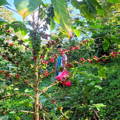Single-origin coffee is coffee that comes from a specific farm or region. Coffee producers take great care in growing and harvesting these beans so that the final product showcases the unique flavors and aromas of their terroir. For coffee drinkers, this means they can explore different regions and taste profiles with each cup.
YOUR COMPLETE GUIDE TO UNDERSTANDING SINGLE-ORIGIN COFFEE

Single-origin coffee.
It has a nice ring to it.
Fancy, yet approachable. Intriguing, yet scientific.
What does it mean, though? Why should you care?
In this Ultimate Guide on Single-origin coffee, we’ll explore all the the aspects of it. We’ll discuss taste, terroir, and sustainability, as well as how to look for the real (single-origin) deal.
So stay tuned – it’s going to be a delicious ride.
SINGLE-ORIGIN COFFEE: THE BASICS

Single-origin coffee stands for coffee that has been sourced from a specific place instead of being a blend of coffees from different locations.
Preferably, the coffee is from the same farm or even the same lot or crop. But sometimes it can be from within the same country or even region.
As the name suggests, single-origin coffee is all about showcasing unique flavors and characteristics.
SINGLE-ORIGIN VS BLEND COFFEE
The main difference between single-origin coffee and blend is, well, the origin. All the beans in a single-origin coffee come from the same country or region. Whereas a blend can be made up of beans from all over the world.
Two single-origin coffees will taste different from one another. Because the soil, water, and climate conditions are different.
In fact, single-origin coffee beans can have notes of blueberry, chocolate, cinnamon, earthy flavors, or floral overtones, depending on the region they come from.
They also have unique acidity levels and body types, making them stand out among blends.
Single-origin coffee is becoming more and more popular because it offers a more complex flavor profile than blends do. By sourcing coffee from a single country or region, you can get a sense of the unique flavor of that place.
Looking for a coffee with a complex flavor profile and interesting flavor notes? Then single-origin coffee is definitely worth trying.
WHEN DID THE SINGLE-ORIGIN COFFEE MOVEMENT START?

The specialty coffee industry started promoting the concept of single-origin about fifteen years ago in response to growing consumer demand for higher quality coffees.
And while the big commercial roasters initially were slow to catch on, today, they are also getting in on the act of single-origin coffee bean sourcing.
With a focus on one place, one farm, and one producer per country or region, this alternative approach to coffee sourcing has been gaining momentum for more than a decade now.
Many consumers have embraced these beans as having superior taste profiles.
"Besides tasting great, single-origin coffee is also much more environmentally friendly than traditional coffee sourcing methods."
It’s worth noting also that single-origin coffees are much easier on the environment because they reduce the need to transport coffee beans across oceans from disparate origins.
For example, instead of importing Colombian Arabica from all over that country’s diverse geography—from high mountains to coastal plains—a roaster could buy beans grown by just a few farmers in one valley using sustainable methods. This reduces pollutants created by heavy trucking and long-distance shipping.
Single-origin coffee is all the rage these days. And for a good reason.
It tastes great and is more environmentally friendly than traditional coffee sourcing methods.
SINGLE-ORIGIN: SINGLE COUNTRY, SINGLE REGION... SINGLE FARM?
The best coffee is like a fine wine. When tasting and enjoying it, there are many factors: the origin of the beans, the roast, and the brewing method. Each of these variables can make a big difference in the final product.
But the word “single” does not have a singular meaning for coffee.
SINGLE-ORIGIN [COUNTRY]

Single-origin coffee is made up of beans from a single geographic location.
But this “location” could be a region. Or even an entire country.
Let’s look at the “country-level” single origin for a second. A nation’s soil can differ from region to region. Rainfall won’t be the same across the nation, either.
So, a single-origin “Honduras” might be a step ahead in terms of unique flavor profiles, but it will still reveal little of a specific terroir.
That’s because Honduras has seven distinct microclimates, and its topography goes from sandy beaches to pine-clad mountains above 1,500 m altitude.
Coffee beans grown next to the sea breeze will taste a world apart from coffee grown in the oxygen-puny hills of Lempira.
QUEUE IN SINGLE FARM/MICRO-LOT COFFEE

This type of coffee comprises beans from a specific farm or set of farms.
Micro-lot coffee is the most superior form of coffee because these are coffee beans from a specific farm or set of farms. The small-scale coffee farmers grow their crop with great care and attention to detail, ensuring that each cup is as delicious as possible.
Furthermore, micro-lot coffee is a great way to support small farmers. By buying micro-lot coffee, you are backing sustainable farming practices. And ensuring that the farmers receive a fair price for their coffee.
WHY DOES SINGLE-ORIGIN COFFEE TASTE BETTER THAN COFFEE BLENDS?

In short, and not without a pinch of pride:
Blends are for the coffee novice, who cannot tell a Guatemalan from a Kenyan. They are for people who want to drink coffee but don’t really care about what they’re drinking. Single-origin coffees are for people who know and love coffee.
On a more serious note, here are the genuine reasons single-origin is better than coffee blends:
When coffee beans are blended, the flavors of the different beans can muddy each other up. This is because different beans have different flavor profiles. And when they’re mixed, these flavors can clash. Or annihilate one another.
Coffee blending often masks any flaws in the coffee beans. For example, when you brew a cup of coffee made from a blend of coffees, you might not taste any bitterness or sourness in the cup. However, if you were to drink a cup of brewed coffee made from only one type of bean, you would taste those flaws immediately.
Often, coffee blends contain beans roasted at different times. This means that the beans in a coffee blend will have different roast levels, which can create an uneven flavor profile in the cup.
Single-origin coffee supports small-scale farmers and helps promote sustainable farming practices.
Certain single-origin coffees havelower acidity levels. This trait makes them easier on the stomach for people who are sensitive to acidity. With coffee blends, it’s challenging to get the same level of low acidity.
Blending different beans is a perfect way to mask up any flaws in the coffee. That's why commercial-grade coffee will almost always be a potpourri of coffees from all corners of the planet."
THE GROWING POPULARITY OF SINGLE-ORIGIN COFFEE

In the past, most coffee roasters sold blends of beans from different regions.
But these days, single-origin is becoming more popular. It’s part of a trend towards more carefully sourced and sustainable products embraced by conscientious consumers worldwide.
As we learn about our food sources, many people have become interested in buying local produce or meat raised in pasture rather than feedlots. They want to know where their food comes from.
The same holds for specialty coffees. Coffee drinkers want transparency regarding what is going into their bodies each morning before work (or after dinner).
So a part of the true single-origin game is offering detailed information so customers can read all about how each varietal tastes who grew it.
Just like wine.
THE FARMERS' TAKE ON GROWING SINGLE-ORIGIN COFFEE BEANS

Farmers who grow coffee beans only for single-origin production take great pride in their work. They see themselves as guardians of a tradition and culture. And they’re committed to producing the best possible coffee.
Many farmers view micro-lot coffees as an opportunity to share their unique terroir with the world.
Terroir is a French word that refers to the environmental factors that influence the taste of a particular wine or coffee. These factors include climate, soil type, altitude, and local traditions.
"By growing specialty coffee beans for single-origin production, coffee farmers are able to showcase their dedication to coffee and make a decent living at the same time."
For coffee producers, terroir is a way of life. It’s something they take seriously. And they’re constantly working to improve their crops by using sustainable farming methods. By growing specialty coffee beans for single-origin production, they’re able to showcase their dedication to coffee and make a decent living at the same time.
Single-origin coffees are often sold in specialty coffee shops by brands who have direct relationships with specialty coffee farmers.
This helps them get more money for their beans, which helps them purchase new equipment or pay workers higher wages. It also gives customers access to unique coffees that would otherwise not exist without these small-scale producers’ efforts.
THE BENEFITS OF DIRECT TRADE FOR SINGLE-ORIGIN COFFEE FARMERS

The single-origin coffee consumers are increasingly conscious of how consumer purchase affects the livelihood of the coffee farmer. This awareness has led to a shift in preference for coffee sourced directly from the farmer.
And the direct trade brings a better understanding of the coffee quality, the unique flavors, and terroir specific to each origin. Not least, it also allows the farmer to receive a fairer price for their coffee.
Coffee is typically sourced from single-origin coffee farmers in remote areas. Single-origin coffee consumers may not have access to these communities without the direct trade model.
Direct Trade provides single-origin coffee producers with an opportunity to build lasting relationships with single-origin coffee consumers that can be mutually beneficial for years to come.
WHAT ARE THE BENEFITS OF SINGLE ORIGIN FOR YOU, THE COFFEE LOVER?

Single-origin coffees are more flavorful and aromatic than blends. They also offer a more comprehensive range of flavor notes. This allows coffee drinkers to explore different regions and taste profiles.
Single origins can use safe water sources that aren’t subjected to the same agricultural chemicals as multi origins. That's why organic coffees often have single-origin profiles because they consider natural conservation methods and sustainable farming practices to produce the best tasting products possible.
Single origins have an additional positive environmental impact by reducing the distance coffee has to travel, meaning they produce fewer emissions along the way.
SINGLE-ORIGIN COFFEE BEANS: THE FUTURE OF HONDURAN COFFEE PRODUCTION
The specialty coffee industry in Honduras has been proliferating over the past few years. This is mainly because of the increasing worldwide demand for single-origin coffees.
As a result, coffee producers in Honduras can now sell their beans at a higher price, thanks to the higher quality of their coffee. And the astonishing results of the latest Cup of Excellence auctions are a testament to that.
This is excellent news for the country’s economy. But most importanlty, our people. It will help improve the living standards of our coffee farmers and their families, which represent an overwhelming 85% of the coffee-growing workforce.
HONDURAN SINGLE-ORIGIN COFFEE FOR SALE
SINGLE-ORIGIN COFFEE FAQ
What is single-origin coffee?
What type of single-origin coffee makes the best cold brew coffee?
When selecting single-origin beans for cold brew, it's important to find a bean that is low in acidity to avoid any bitterness. A light roast is typically best for cold brewing, as it will highlight the sweetness of the bean. Like this one→
What are the benefits of single-origin coffee?
In a world where coffee has become a commodity, single-origin coffee offers coffee drinkers an opportunity to move away from over-exploitation and bad coffee quality. Single-origin coffees also have a positive environmental impact by reducing the distance coffee has to travel.


